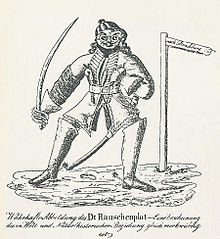Johann Ernst Arminius von Rauschenplatt

Johann Ernst Arminius von Rauschenplatt (also: Johann Hermann von Rauschenplat ) (born October 6, 1807 in Alfeld an der Leine, † December 21, 1868 in Hanover ) was a German revolutionary and freedom fighter.
Life
Noise Platt studied in Berlin and Goettingen jurisprudence and joined in Goettingen the Corps Hildesia (Member of Göttingen Senior Convent ) on. In 1829, he was here with his dissertation: De onere probandi in negatoria actione Dr. iur. PhD and after his habilitation in 1830 private lecturer .
A rather minor dispute within the faculty then led to the so-called " Göttingen Revolution " in January 1831 . The dean had objected to a treatise by the lecturer Heinrich Ahrens , whereupon von Rauschenplatt and his colleagues Ahrens and Carl Wilhelm Theodor Schuster published a protest in a well-known magazine and had the disputed paper printed uncensored in a foreign magazine. This led to an academic investigation, which caused a stir among students and citizens. The students formed a reading society around the three lecturers , citizens from Göttingen and Osterode am Harz expressed their solidarity.
On January 8, 1831, the uprising broke out. At the forefront was von Rauschenplatt, supported by Hildesia's students. The Göttingen magistrate and the police commissioner Westphal were removed without resistance. A local council was formed, and students and citizens armed themselves.
Von Rauschenplatt belonged to the local council and became head of the armed forces, the "National Guard", which alone consisted of 500 students. The academic senate still tried to divide students and citizens apart by wanting to unite the students in a "security guard" under the leadership of the medical professor Langenbeck, but the rhetorical skills of Rauschenplatts prevented that.
The insurgents held proclamations, speeches and parades through the city, but obviously had difficulty defining the political goals they were trying to achieve. As a young student, the later lawyer and writer Heinrich Albert Oppermann was an eyewitness to the events that he described in his first work:
- It was suggested that Osterode be liberated, others wanted to move straight to Hanover and revolutionize everything along the way ; Others wanted to go to Hildesheim first . Nowhere unity and agreement, nowhere conversation and obedience, and so it remained a quarrel […]. As seriously as many regarded the matter, the majority regarded it as just a joke of Carnival. They exercised and patrolled, made parades through the city, and emptied the Philistines' smoke chambers of superfluous sausages, everything to free them. But the women were already complaining about the neglect of the men, the journeymen and apprentices, about the disappearance of the fine supply of sausage and ham; for the Philistines themselves the guard duty was tiring and arduous [...]
- Heinrich Albert Oppermann (pseudonym: Herman Forsch), student pictures
Soon the Hanoverian military approached. The insurgents took measures to defend themselves, and the city gates were barricaded. Nevertheless, the army marched into Göttingen on January 16.
The academic leaders, among them von Rauschenplatt, escaped to France, the leaders of the local citizens were sentenced to long prison terms.
In the next few years, too, von Rauschenplatt continuously took part in revolutionary activities. So he fought with the Belgians for their independence against the Netherlands. In 1832 he took part in the Hambach Festival and was in the military leadership of the Frankfurt Wachensturm in 1833. After its failure, he fled via France to Switzerland, where he persuaded the Diepflingen community near Basel , which held in the turmoil of separation from the city of Basel, to break away from the newly founded canton of Basel-Landschaft and to found their own republic . The pre-March politician Georg Fein was one of his friends in exile . He also took part in the Giuseppe Mazzini uprising in Savoy in 1834 and in the First Carlist War in Spain in 1835 .
After he was also expelled from Switzerland, he worked as a German teacher in Strasbourg from 1836 to 1848 .
After the March Revolution of 1848 he became a member of the pre-parliament of the Frankfurt National Assembly , but later joined the police service of the Reich Administrator Johann von Österreich . Since he took part in the fighting against the Baden insurgents under Friedrich Hecker ( Heckerzug ), he was granted amnesty and was able to return to Hanover in 1851, where he died in 1868 "mentally deranged".
literature
- Barbara Gant: Rauschenplat, Ernst Johann Hermann v .. In: New German Biography (NDB). Volume 21, Duncker & Humblot, Berlin 2003, ISBN 3-428-11202-4 , pp. 208 f. ( Digitized version ).
- Ferdinand Frensdorff : Rauschenplat, Hermann von . In: Allgemeine Deutsche Biographie (ADB). Volume 27, Duncker & Humblot, Leipzig 1888, p. 446 f.
- Egbert Weiß : Corps students in the Paulskirche , in: Einst und Jetzt , special issue 1990, Munich 1990, p. 50.
Web links
Individual evidence
- ^ Johann Ernst Arminius von Rauschenplatt: De onere probandi in negatoria actione. 1829. ( full text in google book search)
- ↑ Antje Gerlach: German literature in exile in Switzerland . Lostermann, Vittorio, 1975, ISBN 978-3-465-01042-5 , pp. 35 ( online at: books.google.de ).
- ↑ Cf. Dieter Lent: Finding aid on the inventory of the estate of the democrat Georg Fein (1803 - 1869) and the Fein family (1737-) approx. 1772-1924 . Lower Saxony Archive Administration, Wolfenbüttel 1991, pp. 82, 347. ISBN 3-927495-02-6
| personal data | |
|---|---|
| SURNAME | Rauschenplatt, Johann Ernst Arminius from |
| BRIEF DESCRIPTION | German revolutionary and freedom fighter |
| DATE OF BIRTH | October 6, 1807 |
| PLACE OF BIRTH | Alfeld |
| DATE OF DEATH | December 21, 1868 |
| Place of death | Hanover |
